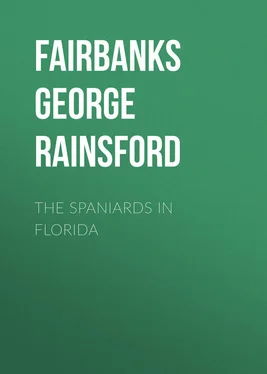George Fairbanks - The Spaniards in Florida
Здесь есть возможность читать онлайн «George Fairbanks - The Spaniards in Florida» — ознакомительный отрывок электронной книги совершенно бесплатно, а после прочтения отрывка купить полную версию. В некоторых случаях можно слушать аудио, скачать через торрент в формате fb2 и присутствует краткое содержание. Жанр: foreign_antique, foreign_prose, на английском языке. Описание произведения, (предисловие) а так же отзывы посетителей доступны на портале библиотеки ЛибКат.
- Название:The Spaniards in Florida
- Автор:
- Жанр:
- Год:неизвестен
- ISBN:нет данных
- Рейтинг книги:4 / 5. Голосов: 1
-
Избранное:Добавить в избранное
- Отзывы:
-
Ваша оценка:
- 80
- 1
- 2
- 3
- 4
- 5
The Spaniards in Florida: краткое содержание, описание и аннотация
Предлагаем к чтению аннотацию, описание, краткое содержание или предисловие (зависит от того, что написал сам автор книги «The Spaniards in Florida»). Если вы не нашли необходимую информацию о книге — напишите в комментариях, мы постараемся отыскать её.
The Spaniards in Florida — читать онлайн ознакомительный отрывок
Ниже представлен текст книги, разбитый по страницам. Система сохранения места последней прочитанной страницы, позволяет с удобством читать онлайн бесплатно книгу «The Spaniards in Florida», без необходимости каждый раз заново искать на чём Вы остановились. Поставьте закладку, и сможете в любой момент перейти на страницу, на которой закончили чтение.
Интервал:
Закладка:
"Daylight having come, Jacques Ribault, Captain of the Pearl, boarded us to confer with us respecting what was to done by us, and what means we should take for the safety of the rest of our men and the vessels. It was then objected, the small quantity of provisions which we had, our strength broken, our munitions and means of defense taken from us, the uncertainty as to the condition of our Admiral, and not knowing but that he had been shipwrecked on some coast a long distance from us, or driven to a distance by the tempest.
"We thereupon concluded that we could do no better than return to France, and were of the opinion that the company should divide into two parts, the one remaining on board the Pearl, the other under charge of Captain Maillard.
"On Friday, the twenty-fifth day of the month of September, we departed from this coast, favored by a strong northerly wind, having concluded to return to France, and after the first day our two ships were so far separated that we did not again encounter each other.
"We proceeded five hundred leagues prosperously, when, one morning about sunrise, we were attacked by a Spanish vessel, which we met as well as we could, and cannonaded them in such sort that we made them subject to our disposal, and battered them so that the blood was seen to overrun the scuppers. We held them then as surrendered and defeated; but there was no means of grappling her, on account of the roughness of the sea for in grappling her there would be danger of our striking together, which might have sunk us; she also, satisfied with the affair, left us, joyful and thanking God that no one of us was wounded or killed in this skirmish except our cook.
"The rest of our passage was without any renconter with enemies; but we were much troubled by contrary winds, which often threatened to cast us on the coast of Spain, which would have been the finishing touch to our misfortunes, and the thing of which we had the greatest horror. We also endured at sea many other things, such as cold and hunger; for be it understood that we, who escaped from the land of Florida, had nothing else for vestment or equipment, by day or by night, except our shirts alone, or some other little rag, which was a small matter of defence from the exposure to the weather; and what was more, the bread which we eat, and we eat it very sparingly, was all spoilt and rotten, as well also the water itself was all noisome, and of which, besides, we could only have for the whole day a single small glass.
"This bad food was the reason, on our landing, that many of us fell into divers maladies, which carried off many of the men of our company; and we arrived at last, after this perilous and lamentable voyage, at Rochelle; where we were received and treated very humanely and kindly by the inhabitants of the country and those of the city, giving us of their means, to the extent our necessities require; and assisted by their kindness we were each enabled to return to his own part of the country." 5 5 Ternaux Compans.
Laudonnière's 6 6 Hakluyt.
narrative speaks more of his own personal escape; and that of Le Moyne 7 7 Brevis Narratio.
refers to this description of De Challeux, as containing a full and accurate account of what took place. Barcia mentions De Challeux, very contemptuously as a carpenter, who succeeding badly at his trade, took up that of preaching, but does not deny the truth of his narrative.
Those who separated from their comrades and threw themselves upon the enemies' mercy, are mentioned by the Spanish writers; but they are silent as to the treatment they received.
CHAPTER VI.
SITE OF FORT CAROLINE, AFTERWARDS CALLED SAN MATTEO
It might naturally be supposed that a spot surrounded with so many thrilling and interesting associations, as the scene of the events we have just related, would have been commemorated either by tradition or by ancient remains attesting its situation. But, in truth, no recognized point now bears the appellation of Fort Caroline, and the antiquary can point at this day to no fosse or parapet, no crumbling bastion, no ancient helm or buckler, no shattered and corroded garniture of war mingled with the bones of the dead, as evidencing its position.
A writer who has himself done more to rescue from oblivion the historical romance of the South than any other, 8 8 W. Gilmore Simms, Esq.
has well said, "It will be an employment of curious interest, whenever the people of Florida shall happen upon the true site of the settlement and structure of Laudonnière, to trace out in detail these several localities, and fix them for the benefit of posterity. The work is scarcely beyond the hammer and chisel of some Old Mortality, who has learned to place his affections and fix his sympathies upon the achievements of the past."
With a consciousness of our unfitness to establish absolutely a memorial so interesting as the site of Fort Caroline must ever be, I shall endeavor to locate its position, upon the basis of reasons entirely satisfactory to myself, and measurably so, I trust, to others.
The account given by Laudonnière himself, the leader of the Huguenots, by whom Fort Caroline was constructed, is as follows: – After speaking of his arrival at the mouth of the river, which had been named the River May by Ribault, who had entered it on the first day of May, 1562, and had therefore given it that name, he says, "Departing from thence, I had not sailed three leagues up the river, still being followed by the Indians, crying still, 'amy,' 'amy,' that is to say, friend, but I discovered an hill of meane height, neare which I went on land, harde by the fieldes that were sowed with mil, at one corner whereof there was an house, built for their lodgings which keep and garde the mil. * * * * * * Now was I determined to searche out the qualities of the hill. Therefore I went right to the toppe thereof; where we found nothing else but cedars, palms, and bay trees of so sovereign odor that Balme smelleth not more sweetly. The trees were environed around about with vines bearing grapes, in such quantities that the number would suffice to make the place habitable. Besides the fertilitie of the soyle for vines, one may see mesquine wreathed about the trees in great quantities. Touching the pleasure of the place, the sea may be seen plain enough from it; and more than six great leagues off, towards the River Belle, a man may behold the meadows, divided asunder into isles and islet, enterlacing one another. Briefly, the place is so pleasent, that those which are melancholicke, would be inforced to change their humour. * *
"Our fort was built in form of a triangle; the side towards the west, which was towards the land, was inclosed with a little trench and raised with turf made in the form of a battlement, nine feet high; the other side, which was towards the river, was enclosed with a palisade of planks of timber, after the manner that Gabions are made; on the south line, there was a kind of bastion, within which I caused an house for the munition to be made. It was all builded with fagots and sand, saving about two or three foote high, with turfes whereof the battlements were made. In the middest, I caused a great court to be made of eighteen paces long, and the same in breadth. In the middest whereof, on the one side, drawing towards the south, I builded a corps de garde and an house on the other side towards the north. * * * * One of the sides that inclosed my court, which I made very faire and large, reached unto the grange of my munitions; and on the other side, towards the river, was mine own lodgings, round which were galleries all covered. The principal doore of my lodging was in the middest of the great place, and the other was towarde the river. A good distance from the fort I built an oven."
Читать дальшеИнтервал:
Закладка:
Похожие книги на «The Spaniards in Florida»
Представляем Вашему вниманию похожие книги на «The Spaniards in Florida» списком для выбора. Мы отобрали схожую по названию и смыслу литературу в надежде предоставить читателям больше вариантов отыскать новые, интересные, ещё непрочитанные произведения.
Обсуждение, отзывы о книге «The Spaniards in Florida» и просто собственные мнения читателей. Оставьте ваши комментарии, напишите, что Вы думаете о произведении, его смысле или главных героях. Укажите что конкретно понравилось, а что нет, и почему Вы так считаете.












